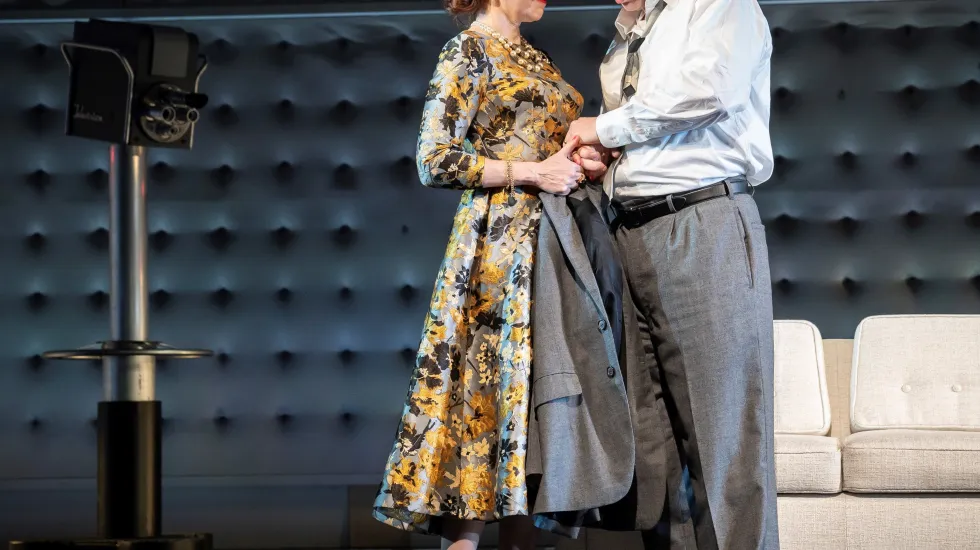
Shall we wax philosophical about the comic and mental illness?
“Roses are red, violets are blue, I’m schizophrenic, and so am I.”
Ten-year-olds still giggle at this line, issued from the humorist and raconteur Oscar Levant.
Others may roll their eyes at the familiarity of the joke, or, more informed about mental illness, think: “That’s not what schizophrenia is.” Or perhaps the listener might recognize consciously that both schizophrenia and split personality disorder are truly debilitating conditions, not exactly laughing matters.
When: Through April 24
Where: Goodman Theatre, 170 N. Dearborn
Tickets: $25-$112
Info: GoodmanTheatre.org
Running time: 1 hours and 40 minutes with no intermission
Is humor about battling mental illness, while recognizing the seriousness of mental illness, stillfunny?
Playwright Doug Wright, in his new play “Good Night, Oscar,” now playing in a Broadway-ready production at the Goodman Theatre, answers that question definitively.
Yes, it is.
But it’s also poignant.
The play, about the one and only Oscar Levant—a great pianist, a great wit, a tortured man with obsessive-compulsive disorder and drug addictions—captures just the right balance of humor and pathos. It’s a contemplative, focused and well-plotted drama wrapped around endless witticisms—many of them Levant’s, plenty of them Wright’s—that make you think throughout that it’s really a comedy because it’s so darn funny.
In an outstanding and multi-faceted performance, Sean Hayes of “Will&Grace” fame plays Levant, who is, in his early 50s, a mess of a man. It’s 1958 and he’s slated to appear in the West Coast debut of “The Tonight Show Starring Jack Paar.” There’s a wee wrinkle, though, as Oscar’s wife June (Emily Bergl) has had her husband committed to a mental hospital after a particularly extreme breakdown. She has arranged for a four-hour pass because she knows that to Oscar, entertaining an audience, and appearing on TV in particular, is something he needs as badly as air and craves as deeply as the opioid Demerol.

What will happen? Will Oscar stay sober, with the help of his chaperone from the hospital Alfred (Tramel Tillman)? Will he implode, explode, or both? Will he bring down on NBC and its president Bob Sarnoff (Peter Grosz) the wrath of angry audiences and sponsors? Will he even be willing to play the piano, his greatest expertise and the initial source of his fame before his wit became clear on quiz shows and led to playing a perennial piano-man sidekick in films like “An American in Paris?”
Director Lisa Peterson and set designer Rachel Hauck beautifully mix small-scale period realism with a television aesthetic early on, and then open up the stage in a way that stunningly expresses the state of Levant’s troubled psyche.
And Hayes… well, he doesn’t actually look much like Levant, but he has chosen this role with great care. It shows off his fullest talents, including a physicality and a comic timing that can’t be beat. Just as importantly, he brings great compassion to a character filled with insecurities, on the constant verge of self-loathing. Levant once said of himself: “I’m a study of a man in chaos, in search of frenzy.” We get that here.
Ben Rappaport plays Paar with the easy grace of a man who knows how to manipulate both quirky artists and uptight network bosses, the confidence that he knows exactly what his audience wants, and the ambition to give it to them despite consequences. Ethan Slater, Broadway’s SpongeBob SquarePants, plays the eager aid who shows us just why celebrities don’t always want attention. And as June, the trickiest role here, Bergl manages to show just how someone could stick with a man who causes her so much pain.
Impressively, “Good Night, Oscar” feels perennially relevant without ever forcing us out of its historical era. There’s the opioid part, sure. And mental health—Levant was one of the first celebrities to talk about it publicly. But most prominently, “Good Night, Oscar” provides a deeply thoughtful take on how social hypocrisies drive popular culture and lead many talented artists to become a human sacrifice to our voracious need for entertainment.
Would the famous and famously dysfunctional perhaps be better off if they retreated from public view?
Oscar Levant would perhaps have been better off, at least later in life, without appearing on television. But then again, as he explains, “I prefer it to living.”







